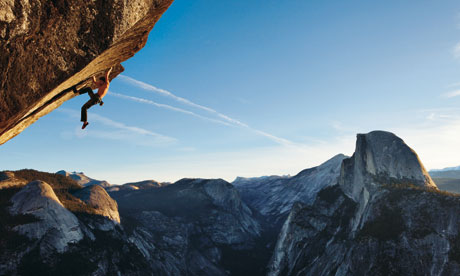
In 1999, documentary maker Polly Morland bought some unfeasibly big pants from M&S in readiness for a trip to Kosovo. She would be shooting a sequence that involved the excavation of mass graves, and had been warned that she would be required to change into forensic overalls alongside police investigators. The pants were to protect her modesty but also, in a way, to shield her from the full horror of what was about to be revealed in the death pits. If she's honest, she says, she's not sure which of the two threats to her composure panicked her most. Either way, this was not what you'd call a Martha Gellhorn moment.
Morland tells the story to show that, despite having made a career out of paddling in dangerous shallows, she is not what you'd call naturally brave. Still, she's met plenty of people who are, and in this book she sets out to rummage inside their psyches to see if there is something – a trick of thinking, a way of being – that can be isolated, amplified and reproduced by the more craven among us. In an age of so many real and imagined terrors can we, in fact, learn to be brave?
Wisely, perhaps, Morland doesn't use her enormous pants as the organising idea of her investigation. Instead she revives an anecdotal curio from 1940s New York. As the US shuddered and galvanised itself after Pearl Harbour, a group of anxious musicians gathered in the Upper West Side apartment of concert pianist Bernard Gabriel. Each was paralysed by stage fright, finding it impossible to perform in public. Gabriel's solution was to get them to play on their instruments while the rest of the room bished and bashed, chatted and shrieked, blew whistles and rang bells. After a session of Gabriel's rough desensitising, stepping on stage at Carnegie Hall felt like a breeze. The name Gabriel gave to his dry-mouthed musicians was The Society of Timid Souls.
One of Morland's first steps is to track down the descendants of those fearful New York orchestralists. These days it turns out they're all on beta blockers and managing just fine. It's different, though, for solo performers. Morland talks to soprano Renée Fleming, who was booed by the loggionisti, the critical section of Milan's La Scala opera house, in 1998 and had to take a year off before she could sing a note in public again. But, in truth, a book about panicking musicians does not make for riveting narrative, so Morland moves swiftly on to the kind of stuff that we can all agree is really, really brave.
She tells the story of Martin Bell, a young paratrooper who went to the aid of a wounded comrade in Helmand in 2011, and was killed by an IED. And then there's Fleur Lombard, the first British female firefighter to be killed on duty. And David Alderson, who remains physically whole but psychologically clipped after a career spent detonating bombs. There is a dramatic yet unforced quality to the testimony that Morland extracts as she sits with the survivors and onlookers in a series of tidy suburban sitting rooms, discussing various versions of hell. And what all her talking heads agree on is this: being brave isn't a moral choice so much as a deep, sweaty instinct. Even if you've been trained for this moment, something anarchic always takes over. (Bell, a model soldier, was disobeying a direct order when he went to aid his friend.)
Morland doesn't confine herself to the bravery of men and women on active service. Taking a broader, splashier canvas, she seeks out those birdmen who scale glassy skyscrapers for fun, or shin up rock faces with nothing between them and death other than some well-chalked fingers. Then there are the surfers of monster waves and the professional tightrope walkers who inch their way over urban chasms. These men – and they are all men – tend to talk about something "spiritual" in their quest to stare down death, sidestepping Morland's gentle probing, as if to show how bravado differs from actually being brave.
Morland does push harder, though, when it comes to that old Aristotelian chestnut about whether a bad man can ever be truly courageous. In sticky old pubs she talks to villains who, no matter what else you think about them, can hardly be accused of bottling it when they charge into a bank and demand the day's takings. From there she journeys to rural Wales to speak to a group of people who are not bad at all, but simply very dull. In Monmouthshire there is a toastmaster-training circle where quiet people attempt to conquer their fear of public shouting. From there it's off to Boston to investigate a different kind of moral courage, that of Bernard Lafayette, a veteran civil rights campaigner.
In less accomplished hands The Society of Timid Souls would be a horrible hodge podge. But Morland keeps her rhetorical register so high that her narrative just about holds together as she rackets round the world in search of bravehearts. Only towards the end do conceptual fissures start to crack the high lustre of her prose. For the difference between a soldier giving up his life to save his mate, a matador teasing an enraged a bull in the name of sport, or a woman intervening between a slavering rottweiler and a friend's baby are so enormous that they can't be mapped on to a single scale. And while Morland gestures towards building an intellectual framework that would allow her to make comparisons across time and space and culture, understandably she never manages it. What we have, instead, is a series of beautifully written vignettes that function as a meditation on bravery's lovely shimmer, rather than a dissection of its battered heart.

